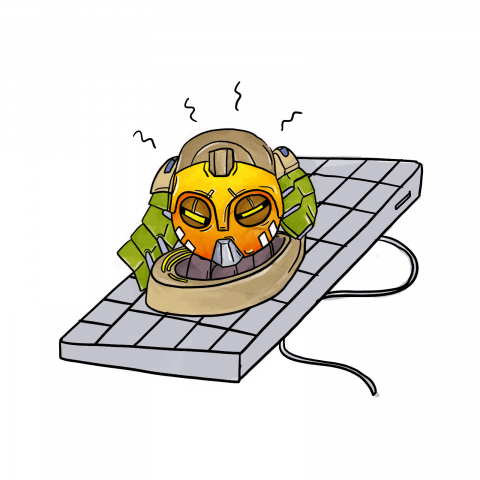As esports increase in popularity, their visibility outside of the gaming world increases, and they begin to occupy the same avenues as traditional sports. Indeed, the professional-gaming population has grown significantly in the past few decades, and the lifestyle of professional gamers has changed along with the industry.
At the collegiate level, there is now more organization and support for competitive esports than ever before. Support for esports in universities began in 2014 when Robert Morris University Illinois, in Chicago, began supporting a League of Legends team with scholarships.
In the four years that have passed, over 50 programs have followed suit, and while the competitive esports scene is primarily based in the United States, there has been some Canadian growth as well.
The importance of scholarships for competitive gaming at the collegiate level is fairly obvious. Many key opportunities for ambitious gamers come during young adulthood, and they are often presented as a choice between two absolutes: whether to go to school or pursue your gaming career. In 2017, the Sheaf even published a story showcasing one student’s decision to pursue competitive gaming over attending university.
More support structures for competitive gamers would give more esports athletes the opportunity to make foundational career moves while also meeting the demands of an academic degree at the same time. Incentives to stay in school while pursuing competitive gaming would give esports athletes the same credential opportunities and back-up plans that the typical varsity athlete has today.

Currently, the majority of collegiate gaming in North America is taking place in the U.S., but moves are being made to expand the esports scene here in Canada.
The University of British Columbia eSports Association is currently working to secure their own scholarships, and the University of Toronto recently created the Victor Xin Scholarship in eSports, which will award money to a student in the school’s Faculty of Applied Science & Engineering who has both an interest in esports and a 3.5 GPA.
In terms of official university esports programs in Canada, there are only two. St. Clair College in Windsor, Ont., and Lambton College in Sarnia, Ont., each have their own varsity teams. St. Clair College provides support for seven games in total, with competitive teams for Super Smash Bros. — both Melee and for Wii U — Overwatch, League of Legends, Rocket League, Counter-Strike: Global Offensive and Hearthstone. Lambton College, however, only supports the basics in terms of esports: CS:GO, Overwatch and LoL.
When comparing the sheer number of programs in each country, the U.S. scene appears to be much further ahead in collegiate esports than those of us living north of the border. But, it’s not for lack of skill — the UBC eSports Association took the uLoL Campus series two years in a row, in2015 and 2016, and Canada is home to a number of proficient esports athletes — including greats such as Michael “shroud” Grzesiek and Damon “Karma” Barlow.
The Canadian realm of collegiate esports may not be booming yet, but it should be viewed as a somewhat untapped market. This is not to say that esports have no home in Canada yet — or even Saskatoon — rather, plenty of players currently compete, but the university connection has yet to be fully realized.

SKL eSports, a local company that hosts esports events in Saskatchewan, has been slowly expanding the competitive scene here in Saskatoon as well as across Western Canada. The company currently features Smash Bros., LoL, Hearthstone and a recently launched league for Overwatch. As participation in local esports increases, the potential for money-making opportunities does as well.
The monetization of esports is one obvious benefit for post-secondary institutions that support these programs, but the process for turning a profit is quite different than the standard systems for traditional sports. Generally, a traditional stadium sport — like football, hockey or soccer — makes income from ticket, concession and apparel sales. Applying the traditional-college-sports model to esports may not be the most successful route to take.
While it would be incorrect to say that there is no interest in viewing esports in a stadium, the main draw comes from online views — directly contrasting college sport, which often focuses on the in-person experience despite the developments to streaming services for the Canada West Universities Athletics Association in the past year.
However, this service runs on a pay-per-view or subscription basis — something that is uncommon in esports, where almost all events are streamed live for free on Twitch.tv — and with the emphasis on streaming over the in-person experience in esports, it seems that the current framework for college sports, which employs paid-streaming services and focuses on the in-person experience, doesn’t necessarily support a shift into esports.
It’s clear that there is potential for more Canadian universities to provide supports and resources for esports at the collegiate level, but the lack of an existing framework for this development could explain some of the apparent hesitation. However, there are real benefits for universities that exist outside of direct monetization — one being that it could get more students in through the door.
Academic support for esports athletes could lead to an increase in the number of athletes who get degrees, and while this is an obvious asset for the athletes themselves — given that they experience the same plights of injury and relevancy that traditional athletes do in their careers — this should be viewed as an asset to the universities as well. Having an esports team is attractive to potential fans as well as potential pros.

More prospective esports athletes who view university as a means to get their careers rolling will mean more students enrolling in these universities, and with the current lack of programs supporting esports, any university that does provide for these athletes is going to stand out as a more attractive option. An esports program makes a great recruiting point for both domestic- and international-student prospects.
A support system for gaming in academia would no doubt create a more positive experience for competitive gamers as well. The Huskies program supports its athletes by creating a culture of academic success with specific study halls and scholarship incentives to maintain a certain grade level.
One of the more interesting aspects of competitive gaming is the variety of ways in which athletes can market their skills. Streaming on Twitch and/or creating Youtube content out of gameplay are two marketing mechanisms that seem to come naturally when one is already gaming for extended periods, and each method can be made into a revenue stream.
A parallel to streaming revenue does not really exist for traditional college athletes. When an athlete is drafted onto a professional sports team, there is payment, but there isn’t much of a market for traditional post-secondary athletes to convert their sports skills into money.
In addition to this, esports tournaments often feature cash prizes, which is simply not the norm in traditional sports — let alone collegiate sports — which brings up the issue of the financial agency of athletes. The lack of financial incentives for university athletes in general, aside from scholarships, is a contentious topic — especially in the U.S., where college athletes help their school teams bring in a fortune but have little control over their own profits.
Of course, athletes are incentivized and rewarded with scholarships, but the argument that there’s an imbalance still exists if athletes are bringing in money but have no agency over it, and seeing an esports athlete’s potential for revenue could add some heat to the fire in this debate.
A counter argument to this point is that collegiate athletes technically aren’t professionals and that, by avoiding high paycheques, the focus remains on academics. It will certainly take more time to see what the norm becomes for collegiate esports — but with direct cash prizes already established, it will be interesting to see how things develop and whether players on collegiate-esports teams will be rewarded for winning tournaments or at all.
Overall, the esports scene will continue to grow, regardless of whether universities set up official programs. However, whether or not the next generation of gaming’s finest will get degrees will likely come down to what foundations are created in the next few years, to support attaining a degree while climbing the ladder to stardom.
—
Jack Thompson / Sports & Health Editor
Graphics: Jaymie Stachyruk
Leave a Reply